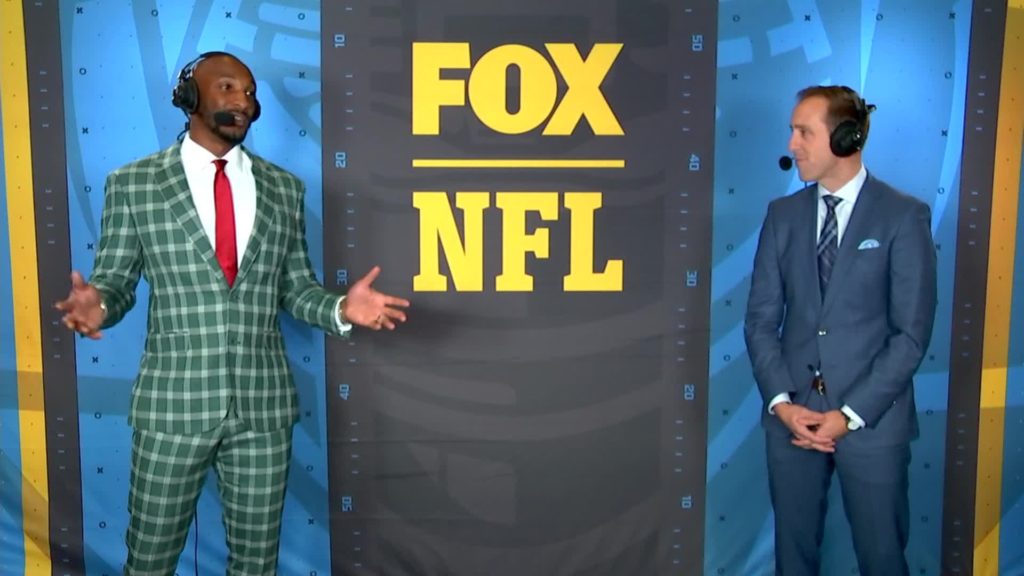Ad Disclosure
In Defense of Aqib Talib

The running joke on Twitter was that if you drink every time Aqib Talib says the word “man,” you’d be hammered by the end of the first quarter.
And that was probably true.
Talib, the 12-year NFL veteran, five-time Pro Bowler, and Super Bowl champion, was calling his first Eagles game and has been broadcasting for about a month now, so this was understandably nascent and raw. His delivery was erratic and he leaned on the crutch word “man” in a very repetitive and distracting way. That’s normal for anybody stepping into the world of broadcasting, no matter where they came from previously.
Social media seemed bitterly divided on Talib’s color commentary, but I kind of liked it, honestly.
He was able to use his wealth of playing experience to help explain what was going on in the game. He pointed out man coverage and zone coverage. He identified receiver routes. He also explained why a penalty flag could have been thrown late in the game when the Eagles were dangerously close to crossing the one-yard threshold for downfield blocking on a passing play.
That’s what he’s there for, to transmit his knowledge to the viewer at home and help us understand what’s happening on the field.
All of the broadcasting-specific stuff is fixable. He can be coached to adjust his delivery, eliminate crutch words, and work in tandem with the play-by-play analyst. FOX executives can very easily sit down with him, watch the film of the broadcast, and point out positives and negatives, the same way a football player would watch the all-22 and make adjustments from there.
Some people may counter by saying, “well how did he pass the first screening? does he have any business being coached at all?”
That’s a fair take, and I hear that. Obviously somebody at FOX thinks they have something in Talib because he has practical experience and credibility that just can’t be infused into a non-player color commentator. You can mold a broadcaster over time, but you can’t give them 12 years of NFL experience. We could sit a non-player in the film room 24 hours a day for 10 years straight, but he or she still won’t have the credibility that a former player brings to the broadcast.
The other thing people have to consider is that retiring from professional sports to become a broadcaster comes with a steep learning curve. Speaking on TV when millions of people are watching is not easy; it’s fucking hard! These guys are not master linguists. They are athletes trying to step into a new world, post-retirement. Any number of color commentators at the network level faced similarly steep curves, guys like Chris Spielman, Daryl Johnston, and Jason Witten. Witten had such a tough time that he un-retired and went back to the Cowboys.
When you think about local examples, guys like Ike Reese, Jon Ritchie, Barrett Brooks, and Ron Jaworski come to mind. These guys were not erudite in the spoken word when they made the transition from player to broadcaster. But to their credit, with time, experience, and coaching, they really improved and found their voice, so to speak. And I don’t mean this as any kind of back-handed compliment, it’s just a matter of fact that athletes-turned-broadcasters face an uphill climb when plopped on the desk next to Ray Didinger, Glen Macnow, and other industry veterans. You and I would struggle if we quit our jobs at age 35 and then tried to become electricians or carpenters. I couldn’t fix a subfloor or repair a busted light socket if my life depended on it.
And last but not least, yes, Aqib Talib is a black man from Cleveland. He speaks the English language differently than a white guy from Wyomissing. It would be cheap to make blanket accusations of bias, but I think we’re all smart enough to know that dialect is a complicated subject that results in many opinions, some of which are reasonable and some of which are not. It’s not always a socio-racial thing, too, and as a specific geographic example, southern news anchors have wrestled for decades now with the idea of dropping their accents in order to make themselves more palatable at the national level, or open the door to a northern market move. This is a topic we could write an entire book on.
But for this story, I’ll run with the contrarian Talib take. I thought he exhibited a lot of practical and credible knowledge. He seemed enthusiastic and excited to be there, which is not always the case with other snoozers in the broadcast booth who are bored and just going through the motions. Everything that people complained about is very easily coachable and fixable and if we give it some time, Aqib might turn into an interesting and unique broadcaster moving forward.
Kevin has been writing about Philadelphia sports since 2009. He spent seven years in the CBS 3 sports department and started with the Union during the team's 2010 inaugural season. He went to the academic powerhouses of Boyertown High School and West Virginia University. email - k.kinkead@sportradar.com